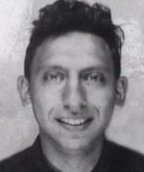| Saville Sax | |
|---|---|
 | |
| Born | (1924-07-26)July 26, 1924 New York City, US |
| Died | September 25, 1980(1980-09-25) (aged 56) Edwardsville, Illinois, US |
| Education | Harvard College |
| Children | Boria Sax, Sarah Sax, Joshua Sax |
Saville Sax (July 26, 1924 – September 25, 1980) was the Harvard College roommate of Theodore Hall, who recruited Hall for the Soviets and acted as a courier to move the atomic secrets from Los Alamos to the Soviets.
Biography
Saville Sax was born in New York City on July 26, 1924, and went by the name of Savvy Sax. He was the son of Bernard Sax (1896–1936) and Bluma Sax (1895–1986). Bluma and Bernard were both born in Russia, of Jewish ancestry. In 1930 they were living in Manhattan with their grandfather Jacob Sax (1874–?). Saville was introduced to Soviet agents by his mother, Bluma, who worked for a Communist front organization called Russian War Relief. Sax went by the cover name "Oldster", and periodically traveled to New Mexico to collect information from Hall.
Saville had a son, Boria Sax, a daughter, Sarah Sax, and a sister, Anne Saville Arenberg (1925-1967).
After drifting from job to job, Saville ended up teaching "values clarification" in a Great Society funded education program called NEXTEP, when he was "something of an adult hippie, disheveled in his personal habits and given to LSD and other hallucinogenic drugs" and "openly boasted of his role in the spying". He died on September 25, 1980, in Edwardsville, Illinois. He was survived by his wife and three children.
References
- Alan S. Cowell (November 10, 1999). "Theodore Hall, Prodigy and Atomic Spy, Dies at 74". The New York Times. Retrieved 2008-06-26.
Mr. Albright and Ms. Kunstel say Mr. Hall and a former Harvard roommate, Saville Sax, approached a Soviet trade company in New York in late 1944 and began supplying critical information about the atomic project.
- Harold Jackson (November 16, 1999). "Theodore Hall. US scientist-spy who escaped prosecution and spent 30 years in biological research at Cambridge". The Guardian. Retrieved 2010-12-19.
This was the only message that ever mentioned Hall, and his fellow spy Saville Sax, by name. All other references used their code names - MLAD (Young) for Hall and STAR (Old) for Sax - which the Venona team had unravelled much earlier but could not identify. The message had been sent shortly after Hall had started work at Los Alamos.
- Bernard Sax (1896–1936) was born in 1896 according to the census and may have died in 1936 according to the New York City Death Index
- 1930 US Census for Manhattan, New York
- Unlocking the Crypts: Most Spies Code Revealed Escaped Prosecution. The Washington Post, December 25, 1996
- "Secrets, Lies, and Atomic Spies | Boria Sax". PBS NOVA. Retrieved 2024-07-07.
- Boria Sax (October 5, 1997). "The Boy Who Gave Away the Bomb". The New York Times. Retrieved 2008-07-18.
- "Theodore Alvin Hall and Saville Sax". PBS. Archived from the original on 2008-09-22. Retrieved 2008-06-26.
- "Deaths". The New York Times. April 22, 1967.
Arenberg-Anne, beloved wife of ... devoted mother of Bernard, loving daughter of Bluma Sax, dear sister of Saville Sax.
- "Traitors In Our Midst". The Washington Post. October 19, 1997.
After drifting from job to job, Saville Sax finally wound up teaching "values clarification" in a Great Society-funded education program called NEXTEP.
- Neil Sheehan, A Fiery Peace in a Cold War: Bernard Schriever and the Ultimate Weapon (New York: Random House, 2009), p. 110.
External links
- "Family of Spies" by Bluma Sax's grandson Boria Sax, WGBH